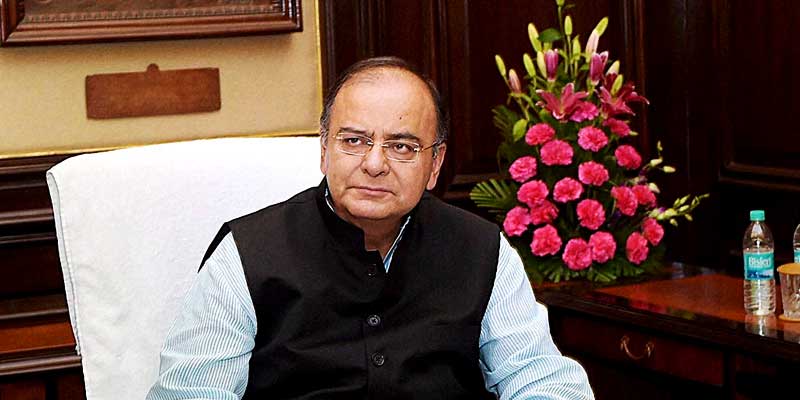The budget was built keeping in mind the basic necessities and aspirations of the common man. And it made a balance with the corporate and industrial class regarding investment and taxation.
One may say that it was a very long and safe budget presented by the union finance minister Arun Jaitley in the Parliament today. Like the Rail Budget, the Union Budget too was non-populist. But there is no doubt that it delivered on the promise of ‘Achchhe Din’ by the Narendra Modi-led Bhartiya Janata Party government.
The budget was built keeping in mind the basic necessities and aspirations of the common man. And it made a balance with the corporate and industrial class regarding investment and taxation.
For example, the common man needs cheaper household stuff, better education, safe water, and pins its hope on development which can be delivered through IT. The finance minister pretty much understood all these desires and delivered on most of them.
While stuff like matchbox, soap, footwear, RO water purifier, desktop, laptop, mobile phones, e-book readers, LEDs, LCD TV (especially below 19 inch), Life micro-insurance policies, DDT insecticide and HIV/AIDS drugs and diagnostic kits were made cheaper, luxuries and injuries items such as cigarettes, cold drinks, pan masla, gutka, chewing tobacco, radio taxi, imported electronic products and half-cut/broken diamonds were made costlier.
In addition to all this, the finance minister announced opening of new educational institutions. Four more AIIMS in Andhra Pradesh, West Bengal, Vidarbha and Purvanchal; five new IITs in Jammu, Chhatisgarh, Goa, AP and Kerala; five new IIMs in HP, Punjab, Bihar, Odisha and Maharashtra; national importance status to Film and Television Institute of India (FTII) and Satyajit Ray Film & Television Institute(SRFTI); and a national sports institution for Manipur was announced by FM Jaitley.
With the education for large young population of the country assured, now the HRD ministry will only have to ensure that these educational institutions maintain educational standards as the original ones.
The important infrastructure development which will link the educated minds across the country, will ensure growth of the country and will also help stop leakages in various schemes are e-governance schemes. The government has allocated Rs 500 crore for the ‘Digital India’ initiative.
Under the Digital India initiative, National Rural Internet and Technology Mission, the government will focus on setting up broadband in villages, promote local manufacturing of hardware and Indian software products.
Jaitley also announced the Deendayal Upadhyaya Gram Jyoti Yojana to offer 24×7 power to rural areas and another Rs 100 crore has been earmarked for the Van Bandhu Kalyan Yojana for tribals.
Also, in what could provide more opportunities for the technology firms, the FM proposed to set up 100 smart cities for which the government will provide Rs 7,060 crore. Besides, in a bid to boost the earnings of the small and medium enterprises, Jaitley said manufacturing units will be allowed to sell their products through retail and e-commerce platforms.
Non-metro airports in the country now account for only about 30 percent of the total air traffic but this is expected to rise to 45 percent in the next few years. Keeping this in mind, new airports will be developed in smaller cities and towns to encourage air travel in the country. FM said that the government plans to build 200 low-cost airports in the next 20 years to connect tier-II and tier-III cities.
Another area which was overlooked for quite some time and demanded attention in the times of rising prices was tax reforms.
The finance minister announced raising of tax exemption limit to Rs 2.5 lakh from Rs 2 lakh, providing a relief of Rs 5,000. The proposal, according to an estimate, is likely to be benefit about 2 crore tax payers.
Tax on income from Rs 2.5 lakh to Rs 5 lakh is retained at 10 per cent, up to Rs 10 lakh at 20 per cent and above 10 lakh at 30 per cent. Jaitley has raised tax exemption limit from Rs 2.5 lakh to Rs 3 lakh in the case of senior citizens too.
He brought cheers to many households when he noted that they are the main contributors to savings. He has raised the investment limit under 80 C to Rs 1.5 lakh from the existing Rs 1 lakh to encourage savings.
Investment in Public Provident Fund up to Rs 1.5 lakh too would be exempted from tax. The tax deduction limit on account of interest of housing loan in case of self occupied property has also been raised to Rs 2 lakh from Rs 1.5 lakh.
The issue of women safety was addressed in the budget. The finance minister has allocated Rs 100 crore under the ministry of road and transport for the women safety projects. It is one of the manifesto promises by BJP close to PM Modi who always talks about “Beti Badhao, Beti Bachao” abhiyan. Although it is not enough but atleast it is a start.
The much needed environment conservation step that was needed o be taken and which was promised by PM Modi was Ganga Development Plan. An integrated Ganga development project with a budget of Rs.2,037 crore, called ‘Namami Ganga’ was announced.
In addition to that, a fund worth Rs 4200 cr was earmarked for 1620 km Ganga inland waterway development from Haridwar to Haldia and same amount was set aside for Jal Marg Vikas project on river Ganga connecting Allahabad to Haldia. This will help the movement n the area in a very big way especially to the labour and business class.
Apart from the Ganga, Jaitley also announced the Swatch Bharat Abhiyan – a plan to “cover every household with total sanitation by the year 2019, the 150th year of the birth anniversary of Mahatma Gandhi…”. For addressing the issue of climate change a national adaptation fund with an initial sum of Rs 100 cr was announced.
The Finance Minister also announced a sum of Rs 500 crore for establishing a `Price Stabilisation Fund` to mitigate price volatility in the agriculture produce, which creates uncertainties and hardship for farmers. Jaitley also said that the interest of farmers and consumers will be served by increasing competition and integrating markets across the country.
Pradhan Mantri Krishi Sinchai Yojana will be started again to help farmers and a sum of Rs 1000 cr has been kept for the same. Also, Rs 14389 cr will be provided for Pradhan Mantri Gram Sadak Yojana.
In a bid to accelerate establishing of a National Market, the Centre will work closely with the state governments to reorient their respective APMC Acts, to provide for establishment of private market yards/private markets. The state governments will also be encouraged to develop Farmers’ Markets in town areas to enable farmers to sell their produce directly.
With such a detailed and fair budget, the government now has to work on is the proper implementation of all these projects and proper utilization of all the allocated funds. The markets also agree that it is the beginning of “Achchhe Din” which should be ensured for a longer time.
The only thing that Jaitley has to work on is the length of his next speech which he will present in February 2015.





